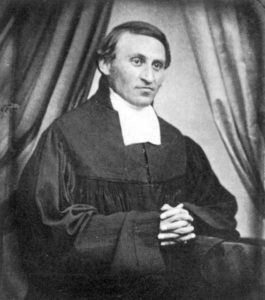against the Cross, 2
Lutheran father (1813-1849).
Friedrich Wilhelm Nietzsche was born on 15 October 1844 in the small town of Röcken, near Lützen in Thuringia. Formerly part of the kingdom of Saxony, it was annexed to Prussia in 1815. Nietzsche was the first-born son of the local Protestant pastor, Karl Ludwig Nietzsche (pictured above), who at the age of thirty had married a woman of seventeen. A year after the wedding, Friedrich was born, followed a couple of years later by his sister Elisabeth (Nietzsche’s younger brother was born afterwards, but died at the age of two). What is important to report is that, among the ancestors of the future philosopher, on both the paternal and maternal sides, there were several generations of theologians.
The main biographies on which I will rely for this biographical series are the very voluminous treatises by Curt Paul Janz and Werner Ross. The latter, who unlike Janz writes with humour, mentions that exactly at the moment when Nietzsche was born the bells were ringing for the king’s birthday service. The parson’s eyes filled with tears as he uttered: ‘My son, on this earth you shall be called Friedrich Wilhelm in memory of my royal benefactor, for you were born on his birthday’. He added that his son would be so-called because that is what Luther’s Bible said. Friedrich Wilhelm IV, by the way, was no friend of the ideals of the French Revolution. Although benevolent, through the Holy Alliance he longed for a return to feudal times even with knights, orders and castles.
Little Friedrich Wilhelm was instilled from the outset with the messianic consciousness of being a son of the medieval king and a son of God. To use my language, I would say that Nietzsche was a slave to parental introjects. So much so that, decades later, when he suddenly fell into a state of psychosis and his friend Overbeck came to his rescue in Turin, he realised that only by telling the disturbed man that royal receptions awaited him, did Nietzsche obey to leave Italy. And when somewhat later Langbehn accompanied Nietzsche on his walks in the asylum at Jena in Germany, he said: ‘He is a child and a king; he must be treated as the son of a king that he is. That is the only correct method’.
But in this psychological study I’m getting too far ahead of myself. Let’s go back to his childhood. The thing is that, like Kant, Nietzsche was brought up in pietism. But Kant’s defence mechanism was to shut down all his emotions and he tried to do philosophy as a sort of Mr Spock through pure reason, like a soulless computer. Nietzsche’s defence mechanism against severe pietism would be the diametrical opposite: the mythopoetic explosion of emotions, as we shall see in this series. What we must now tell is that the little Nietzsche was not allowed, in such a Prussian upbringing, to vent his emotions, let alone his anger. Janz’s multi-volume biography informs us of this:
As soon as the eldest son began to talk a little, the father took to spending some of his free time with him. The child did not disturb him in his study cabinet, where, as the mother writes, gazed ‘Silently and thoughtfully’ at the father while he worked. But it was when the father ‘fantasised’ at the piano that the child was most enthusiastic. Already at the age of one year, little Fritz, as everyone called him, would sit in his pram on such occasions and pay attention to his father, completely silent and without taking his eyes off him. However, it cannot be said that during these early years, he was always a good and obedient child. When something did not seem right to him, he would lie on the ground and kick his little legs furiously. The father, it seems, proceeded against this with great energy, despite which the child must have continued for a long time to cling to his stubbornness whenever he was denied anything he wanted; but he no longer rebelled, but, without a word, retired to some quiet corner or to the lavatory, where he bore his anger alone.
Unlike what Alice Miller wrote about little Fritz in The Untouched Key, Janz didn’t suspect that the severe pietistic upbringing might have been abusive.
When Nietzsche was four years old his father died, perhaps of a stroke (it is not clear that the Nietzsche family’s claim that this was due to his falling down the stairs is true). The family moved to Naumburg and Fritz found himself, from then on, as the only male in a household of women: his mother, grandmother, two aunts and younger sister.
The adult women were to teach pious Christian virtues to little Fritz.
